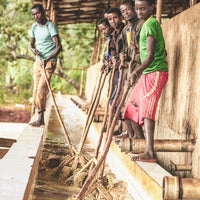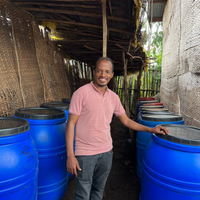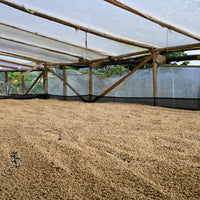Ethiopia Tade GG Natural
Origin: Ethiopia
Region: Guji
Sub Region: Shakiso
Altitude: 1770 meters above sea level
Farm: Tade GG Mountain Forest Farm
Owner: Tesfaye Bekele
Variety: Heirloom
Process: Natural
Tasting Notes: Sweet and complex with notes of strawberry, tropical fruits, vanilla and milk chocolate.
Tade GG (mountain forest farm) is a private farm owned by a gentleman named Tesfaye Bekele. The farm is 221 hectares in area and sits between 1,830 and 1,950 meters above sea level. The general landscape of the farm is characterised by highly sharp and rugged hills, ridges, plateaus, valleys and flats creating stunningly dramatic setting. The regions’ volcanic soil is bursts with nutrients, creating deep red and brown top-layer of soil.
Tesfaye is so passionate about coffee farming that he has traveled extensively throughout Central and South America to visit coffee farms and learn about different cultivating and processing methods.
Tesfaye says when you buy his coffee you not only pay him, you pay the community and the environment. Tesfaye uses native heritage trees as shade and a percentage of his land is dedicated Forest and wildlife area. Tesfaye also funds a local school which he built with profits from his farm.
The Coffee is picked and dried and raised African beds when the early seasons rains stop.
Grades in Ethiopia depend on visual inspection for defects and on cup quality. Grade 1 is considered the highest quality coffee. Grade 1 and 2 are considered specialty coffee, grade 3-9 are classified as commercial coffee. Grade 1 is free of cup faults and taints and has zero quakers.
The Guji region receives ample rainfall and is marked by steep mountainous terrain. Perfect conditions to support the vast array of coffee found here. Only recently have Guji coffees been distinguished from neighbouring Sidamo and Yirgacheffe producing areas. Due to their immense quality and unique profiles however, they are quickly gaining international recognition.
While Ethiopia is famous as coffee’s birthplace, today it remains a specialty coffee industry darling for its incredible variety of flavors. While full traceability has been difficult in recent history, new regulations have made direct purchasing possible. We’re partnering directly with farmers to help them produce top quality specialty lots that are now completely traceable, adding value for farmers and roasters, alike.
The exceptional quality of Ethiopian coffee is due to a combination of factors. The genetic diversity of coffee varieties means that we find a diversity of flavor, even between (or within) farms with similar growing conditions and processing. In addition to varieties, processing methods also contribute to end quality. The final key ingredients for excellent coffee in Ethiopia are the producing traditions that have created the genetic diversity, processing infrastructure and great coffee we enjoy today.
Most producers in Ethiopia are smallholders, and the majority continue to cultivate coffee using traditional methods. As a result, most coffee is grown with no chemical fertilizer or pesticide use. Coffee is almost entirely cultivated, harvested and dried using manual systems.







